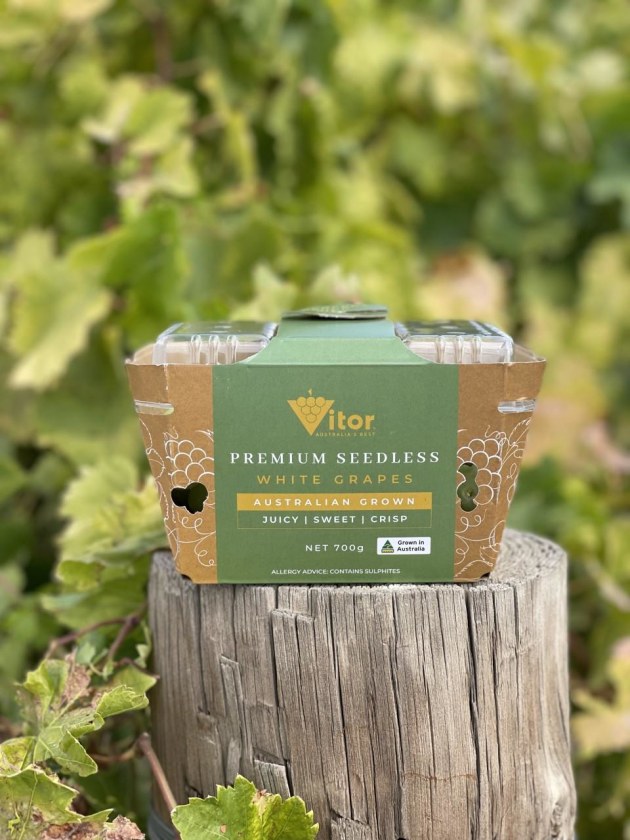Fresh fruit and vegetables company Costa partnered with Gilad Sadan from Navi Co Global to produce the company’s first sustainable hybrid grape punnet.
From vine to supermarket shelf, Vitor’s premium grapes are proudly displayed in fully sustainable grape punnets on Woolworths shelves around the country, thanks to the partnership between Navi Co Global’s Gilad Sadan and Costa, Australia’s leading grower, packer and marketer of fresh fruit and vegetables.
“The Costa grape team partnered with Gilad Sadan to find an innovative sustainable packaging format for our Vitor premium grape product, that would also maintain the quality of our freshly picked grapes from the vines to the lunchbox or grazing table,” says Helen Reece, Costa’s CMO.

“Costa’s brief to produce these punnets was to come up with packaging to promote the premium nature of the grapes and present the fruit beautifully, and at the same time provide functional options and clear on-pack environmental messaging to send consumers to online digital content using a QR code,” explains Sadan.
“Most importantly, the packaging needed to provide a more sustainable option than what the industry is currently using, in line with the 2025 National Packaging Targets.”
The punnets clearly display Costa’s intention to meet these goals. The company’s first hybrid grape punnet is made of an FSC cardboard base with a plastic lid made of 100 per cent recycled PET and is 100 per cent recyclable.
“The new format has 80 per cent less plastic than the previous pack, resulting in an overall reduction in the use of plastic,” says Sadan.
Custom designed
Each of the three Vitor grape varietal packs is designed differently but contains a carry handle and is completely recyclable from cardboard to container and lid, with all components made from 100 per cent recycled content.

They are also manufactured in Victoria, aligned with what Sadan tags, “grow it locally, produce it locally.”
“During the pandemic, it was almost impossible to source products overseas, so we made the conscious decision that these punnets had to be fully produced in Australia, from the grapes to the packaging inside,” he explains.
When Sadan conceptualised the punnets, he drew on global trends in this sector, and was attracted to the idea of producing a functional design and construction that would not only enable the punnets to be carried easily but would also allow the cardboard packaging to double up as a grazing platter, when opened.
“I wanted to ensure that the packaging not only presented well on the shelf and could be carried easily, but that it would also perform more functionally. And so, I came up with the idea for the actual packaging to repurpose as a picnic grazing platter, which, after use, can be folded up to help discard food scraps and ultimately recycled,” he adds, also pointing out that the on-pack QR code details the functionality of the packaging as an integral part of the design.
Throughout the project Sadan collaborated closely with the team at Costa to create a prototype and test the structural design of the punnets.
Working collaboratively from the ideation sessions all the way to a factory acceptance test was highly beneficial, he said, as he gained tips at grassroots level from the employees there and was able to fine-tune elements of the prototype to ensure that the punnets fitted well and stayed intact on the conveyer belts and during the stacking process.
He also had to ensure that the 700-gram grapes would fit into the crates as accurately and efficiently as possible, which he said involved, “lots of accurate measurements, prototypes, and version refinements”.
In addition, since there were the two different components involved in producing the bespoke packaging, Sadan engaged with different suppliers, which fortunately were keen to introduce innovation in the marketplace as well.
In terms of storytelling, Sadan came up with his own creative style of ‘joining the dots’, using embellishments, text, artwork, and shapes (for ventilation holes) on the packs, to illustrate the journey from vine to table, and to allow the grapes to be part of the actual design.
With the branding, he explains that the colours on the logos had to represent the premium nature of the grapes and bring the elements of brand and product together.
Sadan has collaborated with Costa before and says that he has particularly enjoyed the experience of working with the company’s divisional manager, Campbell Banfield, on the Vitor punnet project.
“The team at Costa listen and execute very well,” he says, buoyed by the fact that his passionate ideas were fully embraced which allowed him to draw on his creativity as much as possible.
“At Costa, we are continuously targeting reductions in the use of plastic and non-recyclable packaging to meet the expectations of our customers and consumers,” says Reece. “Environmentally friendly packaging is part of our new product development process, where we actively explore opportunities to promote the use of sustainable materials that are aligned with the 2025 National Packaging Targets.
“The punnets are one of many projects that Costa is planning to produce, to meet the 2025 goals and ideally will provide a catalyst to conversation on the extremely important topic,” says Sadan.
Vitor Premium Grapes are available at Woolworths stores this grape season.
This article was published in the May-June 2022 print issue of PKN Packaging News, p22.





